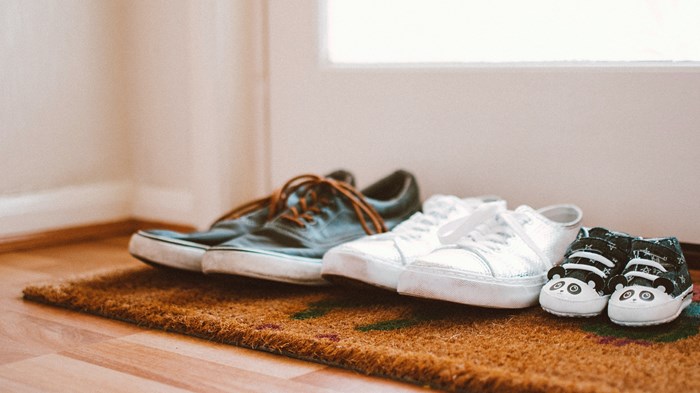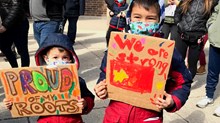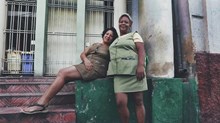It's Time to Acknowledge the Power Dynamics Involved in Accepting Hospitality.

The Italian American comedian, Sebastian Maniscalco, once tweeted, “Shoes don’t come off. My shoes come off once a night, that’s it. Do not do this to grown people.” He made the same comment in his Netflix special, “Why would you do that?,” artfully infusing humor into the experience of being asked for the first time to remove your shoes at someone else’s doorstep.
To be asked to stand barefoot (or in socks) while dressed to the nine can be both awkward and confusing. For some, it’s just not culturally done. For others, however, being asked to remove their shoes when entering someone else’s home feels like an insult. In a recent Wall Street Journal article, entitled “Here’s Why I’ll Be Keeping My Shoes On in Your Shoeless Home,” Kris Frieswick wrote that she would outright refuse to take her shoes off if asked. The issue of shoe removal was something she was ready to go to battle over.
Frieswick glosses over the fact that this is a deeply ingrained cultural practice, preferring to focus instead on the threats of ripped nylons and stepping on Legos. But for many people of Asian and Middle Eastern descent, it would be an insult to refuse to take off your shoes when entering their home. For followers of Jesus who truly want to connect with people of other cultures, there is a real opportunity within situations of shoe removal to show cultural humility by honoring a host’s house norms. Taking off our shoes in Asian and Middle Eastern homes is a way that we can receive the gift of hospitality like Jesus.
There are three well-known stories in the Gospels that interweave shoe removal, bare feet, and hospitality (John 12:1-11; Luke 7:36-50; John 13:1-17). In Luke 7:36-50, a woman with an alabaster jar of oil comes to Jesus while he’s dining in the home of the Pharisee, Simon, and washes his feet with her tears. In this scene, Jesus is already barefoot because it was common in the first century to remove one’s sandals before entering a person’s home. The religious leaders, however, are offended that this woman would dare to touch Jesus’ feet, let alone wash them with her tears and kisses. They see the woman as defiled and fear that if she touches Jesus’ feet, she’ll defile him too.
The debate in this scene echoes our modern concerns about dirty floors and defiled feet. The Pharisees attempt to create rules for engagement to prevent Jesus’ comfortabilities from being upset. However, in a surprising twist, Jesus sides with the woman and declares that he wants to receive the gift of her hospitality. His bare feet serve as a testament to his desire to be the recipient of her care and attention.
Barefoot Jesus challenges our twenty-first century sensibilities of hospitality. Hospitality flows in two directions - not only are we called to regularly welcome guests into our home, but we must position ourselves as guests in other people’s homes as well. Within the practice of hospitality there are inherent power dynamics. When we go to someone else’s home and place ourselves in the position of receiving hospitality, we signal that the host is in the seat of power. This is not an easy practice for many of us as US Americans.
To be at the mercy of a host is to put ourselves in a vulnerable position. It means acquiescing to their house rules and norms, which could include everything from taking off our shoes at the front door (if requested) to eating foods we are unfamiliar with and more.
In Philippians 2:6, however, Jesus declares that equality is not a thing to be grasped and, when we receive hospitality, we declare like Jesus, “I am willing to give up my rights and comforts,” including for some our preferences to wear shoes indoors. Instead of being in the driver’s seat, directing the rules of engagement, we place ourselves in a position to learn, grow, and adapt ourselves like Jesus did for the sake of the gospel. It is in this humble position that God begins to open our eyes to the beauty of other cultures and develops our appreciation for other cultural practices and traditions. If we are serious about true and lasting relationships with people of other cultures, we must intentionally seek to reverse the power dynamics, so that we are in a position to receive. Removing our shoes at a host’s doorstep is a small gesture of power reversal.
Our willingness to be a recipient of hospitality shouldn’t be seen as burdensome. In fact, in John 12:1-11, when Mary of Bethany anoints Jesus’ head and bare feet with an expensive perfume, Jesus declares that he has received a high honor! There is a spiritual blessing to be found in receiving hospitality. Jesus drives home the beauty of barefoot hospitality when he washes his own disciples’ feet in John 13:1-17.
Professor of Bible and Mission, Dr. Jae Suk-Lee, argues in Mission as Integrated Witness: A Missional Reading of the Foot Washing Narrative that the disciples’ exposed feet was an essential step in their journey toward integrated witness of evangelism and learning to build missional communities. Lee describes the act of footwashing as a “mutual loving service” that “generates unity in the community and the world. This footwashing act is the model and cause of the disciple’s mission” (35).
On the one hand, the symbolic gesture in all three biblical stories of bare feet and foot washing serve as foreshadows to Christ’s death and the partaking of the Eucharist. But on the other hand, it is a rite of passage; a litmus test to assess the disciple’s readiness to be unleashed into the world. Likewise, part of the litmus test for our readiness as believers today to be sent out on mission is determined in our ability to remove our shoes in another person’s home and receive their hospitality.
Being willing to remove our shoes in an Asian or Middle Eastern home also extends beyond power dynamics. Certainly, there is a cleanliness factor. Shoes bring in the dirt and grime of the outside and leaving them at the door is a courteous way to not track these items into someone’s home. However, there is a greater cultural gesture taking place in the practice of shoe removal. To invite someone into your home and take off their shoes is a symbol of care. It’s the host’s way of saying, “Come relax. Take a break from the worries of your day. I’m going to take care of you.”
This is why it is so heartwarming for me, as a second generation Indian American, to watch scenes in Asian films such as Raya and the Last Dragon or Shang Chi and the Legend of the Ten Rings in which the protagonists remove their shoes at a doorstep. It signals that the place they are entering is safe, warm, and perhaps even sacred. They are entering into a place where they can be themselves and relax, where they’ll be taken care of, and most likely served delicious food and drink. When you remove your shoes at an Asian or Middle Eastern doorstep, you enter in as a guest, and you leave as family. Such is the power and message of shoe removal in Asian and Middle Eastern cultures.
We need to recapture a robust theology of countercultural hospitality; a hospitality in which we allow ourselves to be served and not just serve. Instead of only focusing on welcoming the stranger (Matt 25), we need to put ourselves in a position for the stranger to welcome us. In the US, we live in a multicultural globalized society. Our neighbors, coworkers, and fellow church congregants have roots from around the world. What if we regularly asked if we could come over to their home like Jesus did? And what if, for our hosts who are Asian or Middle Eastern, we don’t even ask if we should take our shoes off when we arrive; we just do it automatically, allowing our bare feet to testify our vulnerable willingness to receive whatever kindness the host is about to offer us?
Dr. Michelle Ami Reyes is the Vice President of the Asian American Christian Collaborative. She is also the Scholar in Residence at Hope Community Church and author of Becoming All Things: How Small Changes Lead to Lasting Connections Across Cultures. Dr. Reyes lives in Austin, Texas, with her husband and two amazing kids.
The Better Samaritan is a part of CT's
Blog Forum. Support the work of CT.
Subscribe and get one year free.
The views of the blogger do not necessarily reflect those of Christianity Today.





















